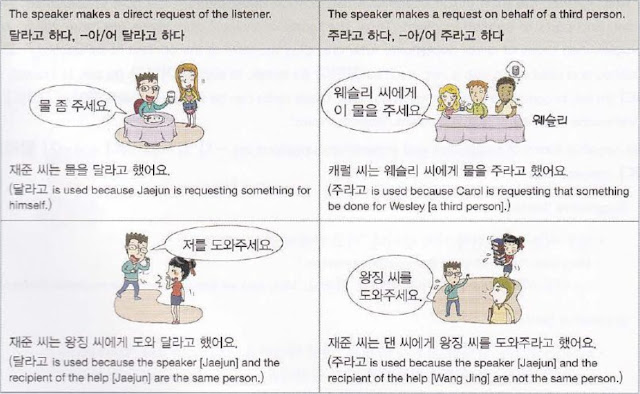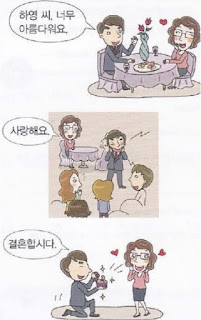민우 씨가 저에게 정말 아름답다고 했어요.
Minu said I was really beautiful.
하영 씨가 저에게 사랑한다고 그랬어요.
Hayeong said she loves me.
민우 씨가 결혼하자고 했어요.
Minu said we should get married.
Grammar Focus:
An indirect quotation refers to the citing, without the use of quotation marks, of what someone wrote or said. Further, the form of the expression can change depending on the type of quotation, verb tense, and parts of speech involved. Thus, the forms of indirect quotations are more varied and complex than those of direct Quotations.
After changing the form of the content to be emoted, -고 is attached and used along with a verb such as 말하다 (to speak, to say), 물어보다 (to ask, to inquire), 전하다 (to tell, to convey) or 듣다 (to listen, to hear). These verbs can be substituted with 하다 or 그러다.
Vst means “Verb stem”, and Ast means “Adjective stem”.
The negative forms of suggestive and imperative quotations are 지 말자고 하다 and -지 말라고 하다, respectively.
1. Suggestive Sentences
• 민우 씨는 “내일 산에 가지 맙시다.”라고 말했어요.
Minu said, “Let’s not go to the mountain tomorrow.”
->민우 씨는 내일 산에 가지 말자고 했어요.
Minu said we shouldn’t go to the mountain tomorrow.
2. Imperative Sentences
• 의사 선생님이 “담배를 피우지 마세요.”라고 하셨어요.
The doctor said, “Don’t smoke.”
->의사 선생님이 담배를 피우지 말라고 하셨어요.
The doctor said not to smoke.
When the first person pronoun 나/내 or 저/제 appears inside an indirect quotation, it changes to 자기.
• 왕징 씨가 “저한테 얘기하세요.”라고 말했어요.
Wang Jing said, “Please tell me.”
->왕징 씨가 자기한테 말하라고 했어요. Wang Jing said to tell her.
• 리처드 씨가 “제 고향은 뉴욕이에요.”라고 말했이요.
Richard said, “My hometown is New York.”
->리처드 씨가 자기(의) 고향은 뉴욕이라고 말했어요.
Richard said his hometown is New York.
Conversation:
A: 제이슨 씨 여기 있어요? Is Jason here?
B: 없는데요. No. he’s not (here).
A: 제이슨 씨가 오면 식당으로 오라고 전해 주세요.
When he gets here, please tell him to come to the cafeteria.
A: 삼계탕 먹어 봤어요? Have you tried samgyetang?
B: 아니요, 그렇지만 먹어 본 친구들이 맛있다고 해요.
No, but my friends who have tried it said it was delicious.
When indirect quotations are made from sentences that originally end in 주세요 or -아/어 주세요, these parts change to 달라고 하다 and -아/어 달라고 하다 or 주라고 하다 and -아/어 주라고 하다, respectively. Specifically, when the speaker is making the request directly to the listener, then 달라고 하다 and -아/어 달라고 하다 are used, but when the speaker is asking the listener to help a third party, then 주라고 하다 and -아/어 주라고 하다 are used.
 >> Full of ‘Korean grammar in use – Beginner’: Click here
>> Full of ‘Korean grammar in use – Beginner’: Click here
>> Fanpage: Say Hi Korean

